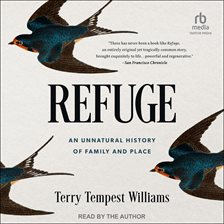5 Titles to Start Your Environmental Feminist Journey
Posted on August 5, 2024
by Melissa L
On (Tu) August 20 at 6 p.m. the Library will be hosting Feminism and Sustainability, Local Farming, and Eco-Activism – Steinem Sisters Collection Talking Circle at Sylvania Branch. Leading up to that event, we’ll start the conversation by interviewing local feminists and environmental activists. Our first interview is with Angie Fitzpatrick, local environmental activist and Steinem Sisters Collection Advisory Board member.
What is your name and what is your background in relation to environmental activism?
Angie Fitzpatrick: My name is Angie Fitzpatrick and I am a lifelong environmental activist. Most recently I owned a community composting business, providing education and services related to recycling organics. I am currently a co-leader for the Toledo chapter of Citizens’ Climate Lobby.
Do you consider yourself a feminist? Did you have an “aha” moment?
Angie: I have been feminist for as long as I can remember. Even as a child, I noticed how women and girls were treated differently than their male counterparts, in ways that seemed unfair to me. In high school I took a literature course at the local community college and after writing a feminist critique of Diet Coke ads, my professor gave me a list of feminist literature which then led me to take women’s studies courses. I went on to study gender in graduate school and spent nearly 20 years teaching women’s and gender studies courses and organizing feminist campus programs.
Was there a specific event that brought the issue of environmentalism to life for you?
Angie: When I was a teenager in the 1990s my family moved to a small city in Minnesota where they had compulsory recycling. Each house was given one trash bag to fill per pickup, so we pretty much had to recycle what we could. That got me thinking about how we manage our waste and it’s been a personal passion since then.
How does the issue of environmentalism impact women, communities of color, and/or other oppressed groups?
Angie: There is a long history of environmental issues disproportionately impacting BIPOC communities, as well as women and folks of lower socioeconomic classes across races. We’ve seen this with toxic waste dumping and the placement of landfills in communities of color, as just a couple examples. As the climate crisis forces millions out of their homes around the world, women face barriers to migration including finances, violence and the threat of trafficking.
What do you hope to see change in the future regarding environmentalism?
Angie: The mainstream environmental movement has been predominantly white, middle-class, and male which means that their advocacy hasn’t necessarily addressed the unique challenges faced by communities of color and women. We need an environmental justice approach that emphasizes the rights of all people to live, work and play in clean, safe environments and the right to be involved in environmental policy making.
What are 5 books (or more) that you would recommend that address environmental activism and/or ecofeminism?
Angie: Anything by Barbara Kingsolver, an incredible novelist who weaves climate action, Indigenous rights, and feminism into all of her works.
Refuge: An Unnatural History of Family and Place by Terry Tempest Williams – This classic ecofeminist text explores the connections between women and nature, and the personal implications of politics and pollution.
Braiding Sweetgrass: Indigenous Wisdom, Scientific Knowledge, and the Teachings of Plants by Robin Wall Kimmerer – An enchanting journey through Indigenous ways of knowing and caring for the land.
Fresh Banana Leaves: Healing Indigenous Landscapes through Indigenous Science by Jessica Hernandez – A powerful critique of western-defined conservatism and a call to action that centers Indigenous people’s voices. Not explicitly feminist, but a great environmental justice read.
Nature’s Best Hope by Doug Tallamy – This is not a feminist text, but it’s a great book about how everyday people can support our ecosystem in their own backyards.
What are 5 things readers can do to support environmentalism/climate action/environmental justice?
Angie: 1. Be mindful of your consumption. There’s no such thing as “away.” We’ve all seen the plastic litter that lines our streets and pollutes our water systems. We are also now seeing the damage of our cultural addiction to fast fashion as mountains of discarded clothing grow in the global south. I encourage you to stretch your capacity for reusing items you already own insteading of buying disposables for the sake of convenience. There are also refill shops in our community such as Just Toledo and The Eco-Fill Shop that make it easier for you to reduce your plastic consumption.
2. Be intentional about how you manage your waste. Landfilling should be the last option for our waste, not the first. Recycle your plastics, cardboard, paper, metal and glass. Check with your local municipalities to see what they accept so you don’t pollute the recycling stream. Compost your food waste. There are subsidized food waste drop-off sites at the following Metroparks in Toledo: Botanical Gardens, Glass City, and Swan Creek.
3. Consider the environmental impact of your gardening and lawn practices. If you own or rent property with any amount of greenspace, or a patio, consider adding native flowers that support local pollinators and require less watering than imported species. Homegrown National Park is a great resource for getting started with native plants. You can also be a strong steward of our water by harvesting rainwater for garden and lawn applications. Lucas County Soil and Water Conservation District offers classes on building rain barrels, and you can also purchase them secondhand on Facebook Marketplace or new on Amazon.
4. Volunteer with an organization devoted to climate action. There are so many great organizations in the Toledo area doing the important work of protecting our planet from climate change and they’re always looking for folks to volunteer their time.
5. Learn about climate issues and share what you know. Continue learning about climate change and sustainability, and share what you know with friends, family, and neighbors. Make sure to include a diverse range of leaders and researchers on your reading list so you can get the full picture of climate change issues and solutions
Find your next great read in the Steinem Sisters Collection, located in the Fact and Fiction department of Main Library.
If you would like to get involved with the Steinem Sisters Collection, join our newsletter email list to keep up on all things Steinem Sisters.
Did you like this blog post? Keep up to date with all of our posts by subscribing to the Library’s newsletters!
Keep your reading list updated with our book lists. Our staff love to read and they’ll give you the scoop on new tv-series inspired titles, hobbies, educational resources, pop culture, current events, and more!
Looking for more great titles? Get personalized recommendations from our librarians with this simple form.



